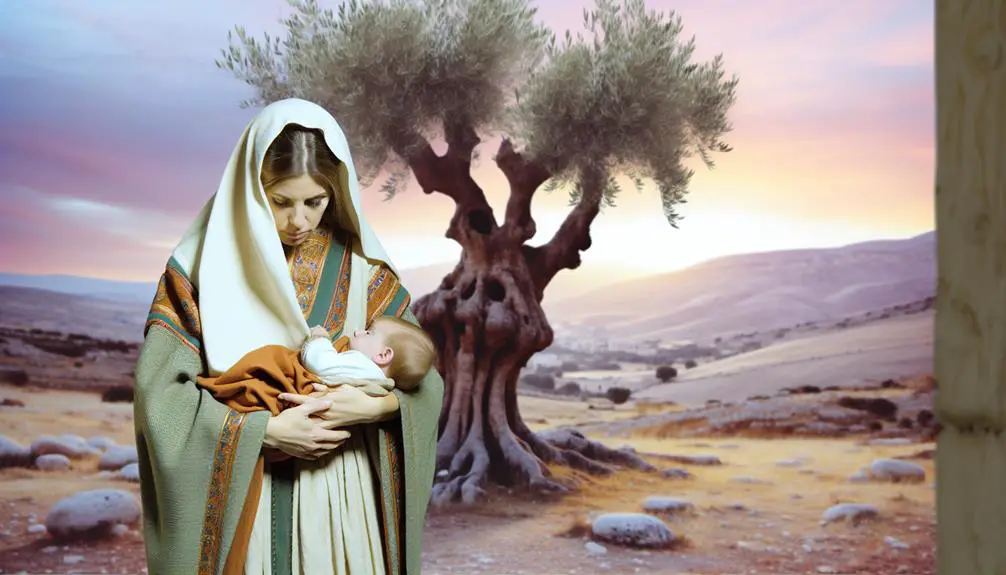This exploration of Isaiah 49:15 delves into the profound connection between maternal love and divine compassion, revealing timeless insights on both.

Can a Woman's Tender Care Cease Bible Verse
You might think that biblical texts rarely touch on emotions as nuanced as a mother's love, but Isaiah 49:15 challenges this notion head-on. It asks, 'Can a woman forget her nursing child, and not have compassion on the son of her womb?'
This verse not only highlights the depth of maternal love but also serves as a profound analogy for divine compassion. As we explore its layers, you'll find there's a rich tapestry of meaning that connects human and divine love, revealing insights that may well shift your perspective on both.
Let's unpack this, and you'll discover why this ancient text still resonates deeply today.
Key Takeaways
- Biblical passages often symbolize women's nurturing roles, reflecting societal norms and divine expectations.
- Interpretation of scripture reveals deep insights into the significance of maternal care and compassion.
- Contextual analysis of verses is crucial for understanding the symbolic meanings and societal implications of women's caregiving roles.
- The application of biblical messages on compassion challenges and expands contemporary views on gender roles and caregiving.
Biblical Origins

The concept of a woman's tender care finds its roots in various passages throughout the Bible, reflecting the profound significance attributed to women's nurturing roles in the scripture. This historical backdrop isn't merely anecdotal; it's foundational, offering a lens through which scriptural authenticity can be assessed. You're delving into a tradition where narratives aren't just stories; they're reflections of societal norms, values, and divine expectations.
Analyzing these biblical origins, you uncover layers of cultural and theological implications. The emphasis on a woman's tender care isn't accidental. It's a deliberate portrayal that speaks volumes about the social fabric of the times and the perceived divine order. This isn't just about identifying historical contexts; it's about understanding how these narratives have been instrumental in shaping perceptions of gender roles through the ages.
As you further dissect the scriptural authenticity of these accounts, you're not simply retracing steps back into ancient times. You're engaging in a reflective journey, questioning how these enduring images have influenced contemporary views on femininity and care. This scholarly exploration isn't just academic; it's a crucial inquiry into the roots of deeply held beliefs and values.
Verse Interpretation
As you explore the interpretation of the verse in question, it's crucial to consider its context within the scripture, which sheds light on its deeper meanings and implications.
You'll find that symbolic elements often reveal insights about the role and perception of women's care across different cultures and epochs.
Reflecting on its application today, you might discern how these ancient narratives continue to influence contemporary understandings of gender and care.
Verse Contextual Analysis
Delving into the verse's contextual analysis offers a deeper understanding of its symbolism and implications, guiding you to appreciate its nuanced message.
It's critical to weigh the historical accuracy of the verse, examining the era and circumstances under which it was written. This scrutiny reveals the societal norms and expectations that influenced its composition, shedding light on its original intent and resonance with contemporary audiences.
Additionally, translation debates play a pivotal role in your comprehension. Different translations can significantly alter the verse's perceived meaning, emphasizing the importance of consulting various interpretations.
This analytical journey deepens your connection to the text, encouraging a reflective exploration of its themes within both historical and modern contexts.
Symbolic Meanings Explored
Exploring the symbolic meanings within the verse invites you to uncover layers of interpretation that resonate deeply with both personal and collective experiences. Delving into this exploration reveals:
- Cultural Implications: The verse's imagery and metaphors are steeped in the cultural context of its time, offering insights into societal values and norms.
- Historical Perspectives: Understanding the historical backdrop against which the verse was written enriches your comprehension of its significance.
- Maternal Symbolism: The depiction of a woman's care serves as a powerful symbol of nurturance, protection, and unconditional love.
- Spiritual Reflections: This exploration encourages a deeper spiritual reflection, prompting you to consider the divine aspects of care and compassion.
Analyzing these elements provides a richer, more nuanced understanding of the verse's message, bridging ancient wisdom with contemporary insights.
Application to Modern Life
Having uncovered the layered meanings within the verse, let's now consider how its insights can be applied to enrich our modern lives.
The verse's emphasis on a woman's tender care challenges and expands our understanding of gender roles. This reflection prompts us to question traditional norms and encourages a more inclusive interpretation of caregiving, recognizing it as a universal, human attribute rather than a gender-specific obligation.
The societal impact of embracing such a perspective is profound. It fosters an environment where empathy, compassion, and nurturing are valued traits in all people, leading to a more equitable and understanding society.
Maternal Love Analogy
The maternal love analogy, frequently evoked in religious texts, offers a profound reflection on the nature of divine compassion and care through the lens of a mother's unwavering love for her child. This analogy illuminates the intricate care dynamics and love resilience inherent in a mother's relationship with her offspring.
To delve deeper into this concept, consider the following points:
- Unconditional Love: A mother's love doesn't waver based on her child's successes or failures. This mirrors the unconditional aspect of divine care, emphasizing acceptance and support regardless of one's flaws or achievements.
- Sacrifice and Selflessness: Mothers often put their child's needs above their own, showcasing a level of self-sacrifice that's reflective of divine love's boundless generosity and willingness to give without expecting in return.
- Guidance and Protection: Just as a mother guides and protects her child, this analogy suggests that divine care also encompasses guidance through life's trials and protection from harm.
- Resilience and Strength: The resilience of maternal love, able to withstand various challenges, symbolizes the enduring nature of divine compassion, always present and unwavering even in the face of adversity.
Reflecting on these aspects offers a deeper understanding of the profound and complex nature of care and love.
Divine Love Unveiled

Unveiling divine love reveals a multifaceted tapestry, woven with threads of unconditional acceptance, boundless generosity, and enduring presence, inviting a deeper reflection on its essence and implications in our lives. This exploration takes you beyond mere theological constructs, guiding you to a profound understanding of how God's omnipotence and eternal presence reverberate through the very fabric of existence.
Aspect |
Impact on Lives |
|---|---|
Unconditional acceptance |
Fosters a sense of inherent worth and belonging, irrespective of flaws or failures. |
Boundless generosity |
Encourages a spirit of gratitude and abundance, recognizing the endless gifts bestowed upon us. |
Enduring presence |
Offers comfort and assurance in moments of solitude and despair, highlighting the constancy of divine companionship. |
This divine love, characterized by God's omnipotence, challenges us to reconceptualize power not as dominance, but as an all-encompassing force that nurtures, sustains, and revitalizes. Meanwhile, the notion of eternal presence reassures us that we are never truly alone or forsaken, fostering a deep, abiding sense of peace and security. As you delve into this analysis, allow yourself to contemplate the profound ways divine love shapes our understanding of existence, guiding us toward a more compassionate, empathetic, and interconnected way of living.
Human Vs. Divine Compassion
Reflecting on divine love's multifaceted nature invites us to consider how human compassion parallels and diverges from this celestial benevolence. It's a journey into understanding the depth of empathy we can offer one another, influenced heavily by our emotional intelligence and societal gender roles.
Here are several ways to explore this comparison:
- Capacity for Unconditional Love: Divine compassion is often described as limitless and unconditional, a standard challenging for humans, shaped by personal biases and societal norms.
- Influence of Gender Roles: Society's expectations can dictate how compassion is expressed, with traditional gender roles often framing women as more nurturing. This perception can both limit and define the scope of human compassion in contrast to a more universal divine compassion.
- Role of Emotional Intelligence: The ability to empathize and understand others' emotions plays a critical role in human compassion. Higher emotional intelligence can bridge the gap between human and divine compassion, enabling deeper connections.
- Limits of Human Compassion: Despite our best efforts, human compassion has its limits, influenced by personal experiences and emotional capacity. Divine compassion, however, is portrayed as boundless, offering solace that human efforts sometimes cannot.
This exploration underscores the complex interplay between divine ideals and human realities, shaped significantly by emotional intelligence and societal constructs around gender roles.
Contextual Significance

Understanding the contextual significance of divine versus human compassion requires examining how societal constructs and personal experiences shape our perceptions and actions. The historical backdrop and cultural influences play pivotal roles in interpreting biblical verses, particularly those concerning a woman's tender care. This comparison isn't just about contrasting divine omnipotence with human limitation; it's deeply rooted in the cultural context of the times.
Aspect |
Divine Compassion |
Human Compassion |
|---|---|---|
Scope |
Infinite, boundless |
Limited, conditional |
Motivation |
Unconditional love |
Mixed, often self-serving |
Reliability |
Unfailing |
Inconsistent |
In the biblical era, women's roles were significantly influenced by cultural norms, which often limited their public and religious participation. However, divine narratives frequently elevate these tender, caregiving roles to illustrate a form of love that is meant to transcend human limitations. Through this lens, the verse in question isn't merely a commentary on a woman's capacity for care but a reflection on how divine love can inspire beyond the constraints of human flaws and societal expectations. Reflecting on this, you're invited to ponder the depth of both divine and human compassion, recognizing how each is shaped by historical and cultural contexts.
Personal Reflections
Delving into personal reflections, it's crucial to examine how the divine and human forms of compassion resonate within our own lives, shedding light on our perspectives and behaviors. This introspection not only enlightens us about our capacity for empathy and care but also prompts a deeper understanding of the biblical text through the lens of:
- Historical accuracy – Assessing the context in which these words were written enriches your comprehension, challenging you to consider the societal norms and cultural values of the time. This exploration might reveal the multifaceted nature of compassion across different eras.
- Translation debates – Engaging with various translations and interpretations of the scripture invites you to reflect on the nuances of language and its impact on the message conveyed. This scrutiny might lead to a more inclusive appreciation of the text's significance.
- Personal biases – Acknowledging your preconceptions encourages a more honest engagement with the scripture, allowing for a transformative reading experience.
- Empathy's limits and potentials – Contemplating the boundaries and possibilities of your empathy fosters growth in your spiritual and emotional journey.
Analyzing these aspects in your life isn't just an academic exercise; it's a spiritual quest that deepens your understanding of divine compassion and its manifestation in human interactions.
Applying the Message

Transitioning from reflection to application, you'll discover that embodying the scripture's teachings on compassion necessitates a deliberate integration of its principles into your daily interactions and decisions. This approach not only deepens your personal growth but also enriches the lives around you, fostering a community grounded in understanding and empathy.
The scripture under discussion, often interpreted through various cultural lenses, offers a profound message on the universality and timelessness of compassion. Your application of these teachings should be informed by both historical parallels and current cultural influences, allowing for a nuanced understanding that transcends temporal and societal boundaries.
To guide you in this endeavor, consider the following table, which juxtaposes historical contexts with present-day applications, highlighting the interplay between cultural influences and the enduring nature of compassionate acts.
Historical Context |
Modern Application |
|---|---|
Ancient practices of hospitality |
Fostering inclusivity in communities |
Maternal figures as caregivers |
Embracing diverse forms of nurturing |
Rituals of compassion |
Implementing mindfulness in daily routines |
Community support systems |
Building networks of mutual aid |
Moral teachings on kindness |
Advocating for social justice initiatives |
Analyzing these parallels encourages a reflective and active engagement with the scripture, urging you to embody its timeless message in a way that resonates with today's multifaceted world.
Frequently Asked Questions
How Has the Interpretation of This Verse Evolved in Modern Feminist Theological Discourse?
In modern feminist theological discourse, feminist hermeneutics has deeply influenced the theological reinterpretation of traditional texts. Scholars have re-examined scripture with a critical eye, aiming to uncover and challenge patriarchal interpretations. This approach has led to a richer, more inclusive understanding of spirituality and divinity, emphasizing the importance of women's experiences and voices in theological discussions.
It's a reflective, analytical journey into the heart of faith from a feminist perspective.
In What Ways Have Different Cultures and Religions Outside of Christianity Referenced or Adapted the Sentiments of This Verse?
Exploring how different cultures and religions echo a similar sentiment, you'll find the universe is practically bursting with cross-cultural parallels and religious adaptations.
These expressions weave through texts and traditions, showcasing an astonishing global tapestry of maternal devotion.
Are There Any Notable Literary Works or Pieces of Art Inspired Specifically by This Verse, and What Themes Do They Explore?
You'll find that various literary works and pieces of art, inspired by the themes of maternal love and compassion, delve deeply into these emotions.
Musical adaptations and sculptural interpretations, in particular, have explored these sentiments in profound ways. They reflect on the universal and enduring nature of a mother's love, often drawing parallels with divine affection, highlighting both its strength and vulnerability in a manner that resonates across cultures and time periods.
How Do Psychological Studies on Attachment and Maternal Instincts Correlate With the Themes of This Verse?
Exploring maternal psychology and attachment theory, you'll find a rich tapestry where emotions and instincts intertwine. These studies delve deep into the essence of maternal bonds, mirroring themes of unwavering care and devotion.
Through an analytical lens, it's evident how these theories reflect the universal truths about a mother's love, suggesting an innate predisposition towards nurturing. This scholarly reflection highlights the profound connection between psychological insights and the enduring nature of maternal affection.
What Role Does This Verse Play in Contemporary Debates About the Nature and Necessity of Gender Roles Within Familial and Societal Structures?
You're diving into how gender politics and economic implications intertwine with family and societal roles. This discussion isn't just theoretical; it's pivotal in shaping perceptions and policies around gender roles.
Reflecting on this, you see it's not merely about who does what in a family, but how these roles are valued and supported economically and socially.
It's a crucial conversation for understanding and challenging the structures that define our daily lives.
Conclusion
In your journey through this passage, you've traversed the delicate balance between the unwavering compassion of a mother and the infinite love of the Divine. Through the lens of a single verse, Isaiah 49:15, you've seen how maternal affection, although profound, pales in comparison to God's boundless mercy.
This exploration hasn't only deepened your understanding of divine compassion but also invited you to reflect on the nature of love itself—both human and divine. In this reflection, you've discovered that while human love may falter, God's love remains steadfast, offering a comforting reminder of the unshakeable foundation upon which faith rests.



Sign up